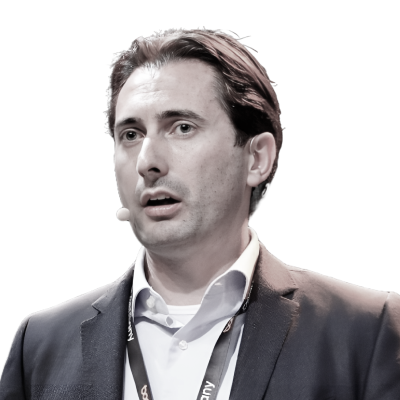
Dr Mark van Rijmenam
International Speaker, Author and Strategist
The Future of the Metaverse and How Brands Should Use It
Is “complete decentralisation” possible any time soon? Can human nature handle it? When are we going to have a really immersive, organic metaverse experience (as opposed to just having fun with our lookalike avatars in a clumsy virtual environment)? What shall we do to avoid the mistakes we did with web2 and don’t allow tech giants swallowing us up again?
We discussed the future of the Metaverse with Dr Mark van Rijmenam, international speaker, strategist and book author on the future of tech, blockchain and the Metaverse. He’s recently finished his latest book “Step into the Metaverse” and as part of his writing journey he has discussed these topics with over 250 metaverse experts and tech visionaries, so has a pretty good guess where space is heading. Enjoy our latest episode. Follow Mark on Twitter and LinkedIn.
Transcript
Please note this transcript is automated
Desi Velikova 00:00
Hi everybody, with all the hype and hopes for the future of the metaverse in web3, the big question in the last six months has been not if that when are we going to really live in it and have the extension of our real life as opposed to having a bit of fun with out lookalike avatars. One of my dreams in delivering this podcast to you in a completely new immersive environment, where we all tune in from different parts of the world with our headsets, appearing as our holograms and having a real social experience in the metaverse. One person whose ambition is to build this is Dr Mark van Rijmenam . Mark has branded himself as a digital speaker. He’s a tech strategist, international speaker, author expert on disruptive innovation, big data, blockchain and the metaverse. We talked about when he thinks this is going to be possible. Can human nature handle complete decentralization? What are the unintended consequences? And what can we do to make sure we don’t repeat the mistakes we did with web2? He’s recently finished his latest book called “Step Into the metaverse: How the immersive Internet will unlock a trillion dollar social economy” and in today’s episode, he’s sharing some of his insights with us.
01:18
Desi Velikova 01:29
Hi, Mark, how are you doing?
Dr Mark van Rijmenam 01:31
Hi, Desi, I’m very good. Thank you. How are you?
Desi Velikova 01:33
It’s a pleasure to have the Digital Speaker here with me. So you basically branded yourself as “The Digital Speaker”. Even your website is TheDigitalSpeaker.com. Companies and organizations and events can hire you to perform keynotes as your avatar or your hologram. And you can appear virtually on any stage around the world. Can you tell us a little bit more about the work you’re doing is the digital speaker and also what’s been your professional journey so far?
Dr Mark van Rijmenam 02:01
Sure. Well, thanks for having me. First of all, it’s a pleasure to be here. And yes, I indeed started the digital speaker two years ago. Basically, I’ve been a keynote speaker for almost a decade now. And just like everyone else, you know, when the pandemic hit, I wasn’t able to fly anymore. So I had to come up with with a different different way of doing my work. So I’ve always been talking about digitalization digital transformation, big data, blockchain and AI. So I thought, why don’t I practice what I preach? Why don’t I did it last myself, because if I can, if I can digitalize myself, as a small business owner, any organization should be able to digitalize themselves. So that’s my sort of the the idea behind it. And stifled, you know, let’s go for it. I created my avatar, I created a holographic presentation of myself. I did shows where my avatar appeared as a hologram way before everyone started talking about the metaverse. And it’s been really, really cool experiences. So I rebranded my website, and I am now digital speaker, which is as an added benefit is that at least people can pronounce this because my last name is very difficult for for non Dutch speakers. So even for Dutch speakers, it’s difficult. So that’s an added benefit. And that people can easily easily find me online. But it’s been a great journey. I’ve been in the space of a decade talking and thinking about emerging technologies, how to change organizations, how to change society, and also recently how they change the metaverse and I really take the approach of you know, how can we ensure that we use these technologies for the for the for the benefit of humanity for him for the betterment of society? Because in the end, technology is neutral so we can use it to to to improve the world. We can use it to ruin the world. And my focus has really been on on how can we use these emerging technologies to create a better society. And yeah, this is different I’ve been doing in the past last decade, and it’s been a great journey so far.
Desi Velikova 03:59
Oh, sounds super exciting. I heard you saying that your ultimate aim is to deliver a talk show in the metaverse where the host, the guests, the audience, everyone is tuning in from different parts of the world. They’re probably speaking different languages, but they can have to get this immersive experience in the metaverse a little bit like “Oprah in the metaverse” and to me honestly, it sounds amazing. I’m looking forward to putting this in proper practice. So how far are we from this? And what do you think we need to do more to get closer to this ideal Metaverse situation?
Dr Mark van Rijmenam 04:35
Yeah, well, that’s absolutely my ambition to do that. And after I’ve been working on that, I’ve created the tech journal where my avatar delivers covers the digital world, literally from inside. This is a world which is then projected as a 2d image. You can find it on the website, which is nice, you know, it looks good. The stories, I think, are interesting, but the avatar looks so so. So what I’m currently doing Is I’m currently building a digital human to exact digital replica of me. But then in 8k format, so hyper realistic, you can really zoom in on every little specks and everything on my face. And I’m wanting to use that as a starting point. Once I have that, I will be able to do my keynotes also with my digital human. And from there on, I can start moving slowly towards my ambition of doing this opera in the metaverse. And because I think it’s really cool because if you have that, if you if I can be in virtual reality as it is, as digital human, my guests can be like that. The audience can be like that. And people can basically wander around the studio and explore easter eggs, you know, explore different, different things that are happening at the same time, while the show is going on. People can take selfies with with with the guests, and there will be high profile guests, I think that would be really, really awesome. Apart from the content that you will discuss with those people, but also the experience that you can give people. But to be honest, I think that’s still quite a few years away in order for us to to achieve that. Because it’s still really, really hard to do that. You know, with with my original avatar, I use the full mocap suits or motion capture so that it captures all the movements of your body. But you also need facial recognition. So not facial recognition. But you need to mimic your your facial expressions in the metaverse, you need to analyze that you have all kinds of apps and technology for that. But it’s still really hard. And I noticed that at the moment myself by by doing building my digital human, it’s very difficult to get to a level that I want to bring it to and reasonably afford it for the listeners they might have, they might be familiar with the matrix awakens, which is a demo which was created by Warner Bros in combination with Unreal Engine from Epic Games as a way to promote the new matrix movies and the 2021. And the interesting thing is that 10 minute show has been made completely digitally. So if you see Keanu Reeves in that show, he doesn’t exist there. He’s made, just like I’m building my digital human, he is completely existed in digital format. But there were two other people working on that project to make that happen. So that sort of shows you how challenging it is to get to the level where I want to go. But yes, it’s definitely my ambition to at some point, invite you to my talk show as a digital human. And to have a great metaphor of experience.
Desi Velikova 07:31
Yeah, I totally agree. It’s super hard to deliver this immersive experience. I follow a lot of projects, and the majority of them still feel a little bit. I don’t know it’s not, it’s not really organic. It’s not really immersive. It’s a little bit manufactured. So it’s great, you know, to test it out for fun, but it’s not really an extension of our reality and where we wanted to get. Can you give me other examples of brands that you think have done an amazing job entering the metaverse?
Dr Mark van Rijmenam 08:03
I think it’s a lot of companies at the moment exploring the metaverse and my idea of having this immersive hyper realistic couple years away because even even the VR headset cannot handle that because of the degree required compute. But at the same time we see a lot of brands stepping into the metaverse as well you know, there’s a lot of luxury brands who have explored this new ways new channels new marketing opportunity to connect with generations each generation alpha and you know, some some of these examples you might know your Nike, Adidas, they did some fantastic examples and luxury brands, both your bellybutton Jaga and Dolce and Gabbana, Gucci, etc. There’s all they all have explored this new, this new perspective, this new world where they can connect with customers and future customers in completely new ways. In decentraland on Roblox in the sandbox, but we are still very again also this was still very early days, you know, because decentraland and the sandbox, no matter how cool they are, it’s still a bit of like Second Life, you know, it’s it’s still the quality is okay. And it’s it’s nice and it’s a cool experience. And last week we had the the metaphors, metaphors Fashion Week, we’re in all kinds of fashion brands showcased digital fashion, which is going to be huge in the metaverse of truly are also our digital humans now avatars need to be addressed. And, you know, that sort of shows you where this is heading, but again, it’s early days. I think, you know, if you have to look at where the metaverse is it took probably somewhere where the internet was at the end of the 90s. It’s really the big the Googles and the Facebook’s of the metaverse have not yet been built, maybe not even invented yet. So it’s I’m very curious to see where this is going. I have an idea of based on my research My book, I connected to about 250 people for the for that book. So I have an idea of where the metaverse is going. But yet it also takes it takes a lot of time before we get there.
Desi Velikova 10:10
Do you think there is also kind of the generation gap? It does feel like the younger generation like 13, and 14 years old, they’re a little bit more on kind of native today. So for them digital fashion, or when can digital good, it really means a lot. While for probably millennials and even older people, it still feels like I mean, something’s nice to have fun to play with. But it’s not exactly my reality.
Dr Mark van Rijmenam 10:35
Absolutely, absolutely. And I think that’s absolutely the case. And actually, there is a really famous quote, and I’ll read up to you from from Douglas Adams. He’s the he’s a famous, famous author of “The Hitchhiker’s Guide to the Galaxy”, which of course we all know. And in his last book, before he died, he said, anything that is in the world when you’re born is normal, and ordinary, and it just is part of the natural way of the way the world works. Anything that’s invented between when you are 15 and 35, is new and exciting, and revolutionary, and you can probably get a career on it. And anything that’s invented after you’re 35 is against the natural order of things. Well, I think that I couldn’t have said it any better than he did. And that really explains also the generational gaps that we see now where we see Generation Z, those born in the 2000s to generation alpha, those born in 2010s. They have a totally different perspective to to this. They are digital natives, they are Metaverse natives, they are older 50% of the of the teams in the United States. They are on Roblox. They take a completely different approach to to connecting with each other. You know, they are not on Facebook, they’re on Twitter. They’re on Roblox. And for many parents, at least, what if you are a parent, if you are a parent, you might have heard of Roadblocks and Fortnight and Minecraft. But if you’re not even a parent, and you will have probably no clue what this is all about. And all the organizations that I talk to, most of them say we have absolutely no clue, we have absolutely no idea what the metaverse is. Help us! And especially because it is such an important concept and it is the next iteration of the web. And it is very abstract. And there’s so much happening, I can understand that it’s difficult to grasp what’s happening in this space. Especially if you’re 35, you’re over 35 which by the way I am as well. So this is also a new place to me. It’s a fascinating era to be to be alive and to be part of this. But yeah, it is changing really fast. And brands need to work really hard to keep pace.
Desi Velikova 12:46
Yeah. Fascinating. And for people who are new to this, what do you think is like gearing in terms of you know, how hardware and gadget but also platforms, they should test out to get the feeling and understand you know, what is happening in the space? Which one would you recommend?
Dr Mark van Rijmenam 13:03
Well, I think there are different platforms, obviously we have 2d, which is like the fortnight’s Roblox, the Minecraft decentraland, the sandbox and any of the other these are sort of the most well known platforms, but also dozens and dozens of other less well known plasmids that are also coming. Have a look. Yeah, go go check it out. Open account, walk around and see what it’s like and probably at first, like, where did I end up? But that’s good. You know, you can just do feel uncomfortable and explore that world. But the metaverse is obviously a lot more than just 2d. The Metaverse is also 3d and very immersive content. So if you don’t have a virtual reality headset, there are plenty of events where you can go to a museum or you can go to where you can explore virtual reality. Or if you have a VR headset, or you’ve already experienced it, you know, try to do different different games, different applications, different experiences to learn what’s happening and how does it affect you. And then a third way to enter the metaverse is of course augmented reality. Now a lot of people at the moment talk about the metaverse as if it is only virtual worlds with virtual worlds is only a small part of the metaverse. In fact, I dare to argue that to mented reality is going to be way bigger and way more important for the metaverse and virtual reality. Because after all, you don’t really want to walk on the streets. We can’t even with bulky headset over here, it doesn’t really work. And then we see the developments on AR glasses also going really really fast. And that’s I think that’s where the future lies, especially when Apple probably this year or early next year is launching their Apple glasses or whatever they been called. I think there will be like a really a pivoting moment. Despite the probably being really expensive. It will still be a pivoting moment where people start to understand okay, now there’s more than virtual reality and augmented reality can actually have a much bigger impact because you may genuine. If you’re five years from now we can have a slick AR glasses, or maybe 10 years. And we don’t need iPhone anymore. We don’t need a laptop anymore. We just go to the office or we go to cafe we put on our glasses, and we can work. We have five monitors in front of us. And if we need a six to seven monitor, we just spin one up. We have a keyboard that works for us. You know, it’s a completely different way of working. And that’s where we’re heading. And that’s why I think it augmented reality is is really the key driver behind the metaphors.
Desi Velikova 15:33
Amazing. I mean, I think we are all looking forward to what Apple are going to deliver. The pressure is on.
15:39
Let’s definitely,
Desi Velikova 15:41
let’s see if that’s gonna completely wipe our mobile phones.
Dr Mark van Rijmenam 15:47
I forgot his name. But that is a well known Apple analyst who says that, by 2032, Apple will retire the iPhone and replace it with an eyeglass.
Desi Velikova 15:54
Let’s talk a bit about the concept of complete decentralization that web three is supposed to bring. In one of your articles discussing the challenges with NFTs you talk about “Centralization in a decentralized ecosystem”, we keep talking about this complete decentralization, giving the power back to the user, owning our own data, skipping the middleman, and so on and so on. But in reality, what happens with many projects is just going back to the old model, really, we depend on platforms that become powerful businesses that need VC money, hefty marketing budgets, market share, and so on, and so on. So it feels a little bit like history repeating itself. And in all honesty, from my experience with many of those projects, I feel like we really need some sort of governance for the space to grow and to be safe. So what’s your view on that? Do you think human nature can handle complete decentralization? And also, what can we do to make sure that tech giants don’t swallow us up again?
Dr Mark van Rijmenam 16:59
Oh, those are two really big, almost philosophical questions that you asked. But nobody, right? Well, yeah, if only we knew the answer. And I think the way I look at it, and the way I also look at it in my book, Step into the metaverse” is is really I don’t think that complete decentralization is possible in the short term. I think before we reached before we are able to reach complete decentralization of the internet, we are at least I would say, 10, probably more more likely 20 years away. Why? Because it’s simply not possible to to distribute or to stream a hyper realistic, high fidelity volumetric data over a decentralized approach, you know, it’s simply not possible because you need high compute. You need high bandwidth, you need low latency, and things that we struggled to create in a centralized format, let alone a decent class format. So what I think what we should strive for what I think would be also the best approach for the metaverse, which is the next iteration of the internet is, is that we work in a sort of a hybrid way, we take the best of both worlds. And I really believe at the open Metaverse, where we control our data, we control our assets, we control our identity is absolutely key. If we want to, we should avoid making the same mistakes that we did for web2. And we should really allow us you and me to own these these assets. So we should strive for a Metaverse that is hybrid where we use a decentralized components to stream on all those virtual worlds all segments are key experiences. And to make sure that they deliver in a secure way instantly to your to the to the variety of devices that you have. At the same time. No centralized organizations should allow users should enable interoperability allow the user to own these assets, to own their identities, to own the data and to take the data away from the platform to another platform. So that you whenever you earn or you buy, you win or you conquer you create whatever a particular asset in a particular platform, you can take that away from one platform to another. And I think that’s the best best of both worlds, for everyone. And also for for one for big tech, although they might beg to differ. Because they obviously they are addicted to our data. But in the end, it will allow us to create a bigger pie, instead of getting having the big tech creating the taking a bigger slice of the pie. And I think the what we also see in web3 is that, you know, how did we end up in the situation we are currently in web2 is because web1 was very hard to build it spinning up a website was really really hard. hosting your website was really, really hard. So naturally, we had these centralized organizations who thought Well, we can do that for you. And we charge you a little bit, we charge you nothing for that. And as a consequence, these became the big tech that we know today. Big web3 and the metaverse is really, really hard to spin up a Decentraland, to spin up the Sandbox or to spin up an immersive experience. So we have decentralized components who say, well, we can help you with this, this and we can charge you for that we give it away for free, and we take your data. And as a consequence, the web3 parties will become really, really big and will become the big tech of tomorrow. However, I think we still think we should strive that we, from the data identity, in essence perspective, we control that and not the big tech. And I think what we see happening in the new companies working in web3, that they have this perspective, they have this approach of of giving back the data to the ones who created it. I think that that is a good thing. But it is also very important to be aware of that the metaverse can perfectly exist without web3. And a lot of people forget that because a lot of people think that web developers, they’re not the same thing. And we can perfectly have a metaverse that’s built on web2 technologies owned by the current big tech of today. There’s one person who’s trying really, really hard to achieve that. And that will end up in a situation of flux, no crash off like Ready Player One. But that’s it. The Metaverse doesn’t have to use web3. And that’s something that we need to be aware of. Because that means that we need to work really, really hard to convince everyone that we should use web3, because we don’t we’ll end up in a situation that is far worse than the internet of today.
Desi Velikova 21:42
Right? And what do you think are the unintended consequences and risks of what is happening in the moment? And also during their industry? So types of companies that are at risk of disappearing?
Dr Mark van Rijmenam 21:57
Well, if we look at the risk of the metaverse, they are huge. And everyone is currently on a pink cloud. What are How cool are the metaphors is and so awesome itself? And it is you know, it’s a brilliant vision that that’s awaiting us. But there are so many dangers lurking in the metaverse. If you think that web two is polarizing, if you think that web two is causing unintended consequences in society, if you think that web two is threatening democracy, think again, because the metaphors will only extrapolate that if you have deep fakes that you literally cannot distinguish from reality. If I can make a digital image of myself, you can do that too. You can clone my voice and you can be me. And it’s very difficult for me then to tell people that I’m that you are not me. This gets really confusing really quickly. But it’s your that’s only one tiny thing. We also see women being groped being arrested, we were being sexually harassed in the metaverse. That’s a horrible thing because to our brains in the metaverse. If virtual reality is such a high level, your brain can’t distinguish between reality and fake. So that woman has been groped is experiencing that as if she’s being groped in the real world. That’s a really terrible thing. We have from at the same point, if you’re playing I don’t know a first person shooter that’s hyper realistic, it could lead to post traumatic stress syndrome, because to your brain, you are in the war. And there is tons of other problems, that the metaphors we’ll bring that I think that we haven’t thought clearly enough about. And I think we should pay more attention about the dangers that that are coming away. And if we don’t think about that in advance, we tend to risk you know, to sleepwalk into a terrible Society of far worse than the likes of Snow Crash already played one.
Desi Velikova 23:58
The danger for mental health, especially for young people is real when there are so many horrible examples out there that we should learn from. On a more positive note, though, in one of your books, you talk about using Blockchain for social good, how it can contribute to solving climate change, reduce voting fraud, fix our identity systems, improve fair trade. So you basically describe a world built upon peer to peer transactions in smart contracts. And that’s something I’m super passionate about, especially the topic of using Blockchain and the NFT technology to deliver social impact. Can you give us examples of great projects in the space?
Dr Mark van Rijmenam 24:40
Yeah, so it’s very interesting that I wrote that book blockchain transforming your ways your your world, obviously, sorry, transforming your business and our world. Five years ago, I co authored with Dr. Philippa Ryan, while I was doing a PhD and at that moment, there was all the hype over ICOs. Also all the scams or the money making or the gold rush. And we looked at this technology and this fall, you know, this is a fundamental technology. And this is goes, this goes way beyond, you know, the scams and the gold rush that was happening back into 2017 2018. So that’s what we set out to do. And the fact that once you have a database, because that’s what the blockchain is, that is that is readable, and that you can add your data to, but you can’t edit your data, that just changes everything. And all of a sudden, you know, people who didn’t trust each other, can trust each other, and we don’t need intermediate anymore. And we can use decentralized finance, which I think is really interesting concept to give the earned bank access to, to financial inclusion. And once we are able to do that, we can bring them on board 1.7 billion people who don’t have a bank account at the moment. And that’s what blockchain can do. You know, blockchain can can fight corruption, can fight. Problems with with voting can make fair trade really fair. And you see also a lot of examples by in that regard where you know, supermarket, I think Walmart, for example, looks into how can we to make the Farm to Plate supply chain transparent. And I think that’s good for the farmer because farmer and better knows what’s happening with the produce and knows that the parties are being receiving an honest pay for it. But the consumer also understands better how that produce came and came about and how to produce arrived arrived. And that’s in America to let’s say, Europe, or America. And I think that that is really, really important. And there are so many examples within all industries where blockchain can can benefit apart from the financial issue, forget also the supply chain, you know, a lot of surprises in the world. It’s, I wouldn’t say it’s remarkable that I’ve always been working so well until obviously the pandemic it. Because no, because knowing how complex they are, and how much paper is being used, and blockchain can get rid of all that. So it can really make a supply chain a lot more efficient and effective. So to me, Blockchain is still a fundamental technology, it still has the potential to really impact the world and change the world. And blockchain is, of course, part of web three, web three concept, and it’s up to us now how to implement that blockchain technology in all the different parts of our society to improve our society.
Desi Velikova 27:33
Right. And you’re also working on another book at the moment called Step into the metaverse tell me little bit more about topics that will be discussing it and also when is it going to be out?
Dr Mark van Rijmenam 27:45
Sure. So stepping to the metaverse, I just finished it a couple of weeks ago. It will be published in May 2022. So that’s in a couple couple weeks depending on when you’re you’re listening to this. And with this book, I really set out to create a blueprint of how can we create an open Metaverse because I truly believe that we need to change the way the internet works at the moment. Because what we have today doesn’t work for society. It works for small, tiny elite who will make billions and billions of dollars, but it doesn’t work for the majority of people. And the damage that it does to society are just too big. So now we have this technology coming away that will increase the data collection 10 to 100 times compared to today. So if we if we end up in a closed Metaverse owned by a tiny elite, I think we have a really, really big problem. So with this book, I really set out to write out a blueprint of how do we get to an open metaverse. But to do that I firstly describe what is the metaverse and what is what it has the potential for the metaverse to become. And then I just go into depth into the into into detail about how the metaverse will change our identity what it will do to being human. Where can we can we be in the metaverse and what how does the these virtual roles and these augmented experiences will affect society and how we play and work and socialize? I will discuss I discuss how brands can step into the metaverse what they need to do to to get started and to become successful. But also from an enterprise perspective. digital twins are for me a very important aspect of the metaverse is sort of the tire one, with tire zero being the physical world. What does that mean and what role do governments play? And then I go into the economics of the metaverse NFT is I discuss the challenge of NF T’s but also discuss a decentralized finance, Metaverse, finance and how can the content creators of tomorrow use these these these methodologies to really monetize the content that they earn, create by win whatever, and then discussing certain days that we already talked about because I think that’s important and I give three ways how to how to come Until these dangers, and I close off with a future outlook of what the metaverse can become, and how, for example, brain computer interfaces can result it will. In 1015 years from now we will stream the metaverse straight into our brains. And that actually became a lot closer to reality than I anticipated with the purchase of of next point, one of the wearable PCI devices by snap the augmented reality player just a couple of weeks ago. So no, it’s it’s a Yeah, it’s a book that I think would help everyone to understand what the metaverse is, but more importantly, how we can create a Metaverse that’s there for us.
Desi Velikova 30:36
Excellent, I’m looking forward to getting popular in itself. And before I let you go, Mark, tell me, what’s your advice to an 18 year old that is about to enter the workforce, what they should focus on.
Dr Mark van Rijmenam 30:51
First of all, I think you should always focus on doing what you enjoy it because that I think is the most important thing. And you should focus on also preparing yourself for a world that is changing so rapidly, so fast, that you will have multiple careers in your life. That you I would recommend, you know, understanding how this new world works, you know, in when I was a teenager, you know, it was it was and still is beneficial to learn a second or third language, because when you then go to that country, you’re able to be there you know, I’m not a native English speaker, I’m I’m Dutch and I learned English at school. And it’s very beneficial that I live in Australia. And the same applies for I think programming programming languages, I think it’s very useful to learn how this world works. You don’t have to become a developer or a programmer, but at least know how, how this how this language works, how are you how this road is being constructed? I think that will be very useful. And then be open to change, you know, and, and enjoy. It’s going to be a wild ride.
Desi Velikova 31:58
Thanks so much. That was super interested. Interesting, as expected, where can people find you online?
Dr Mark van Rijmenam 32:05
As you already mentioned, the easiest ways to go to the Digitalspeaker.com. I can also share you my Twitter, which is @VanRijmenam, which is a lot more difficult for many people. So the easiest ways to go is to either go to the digital speaker.com Or you can find me on LinkedIn as well.









